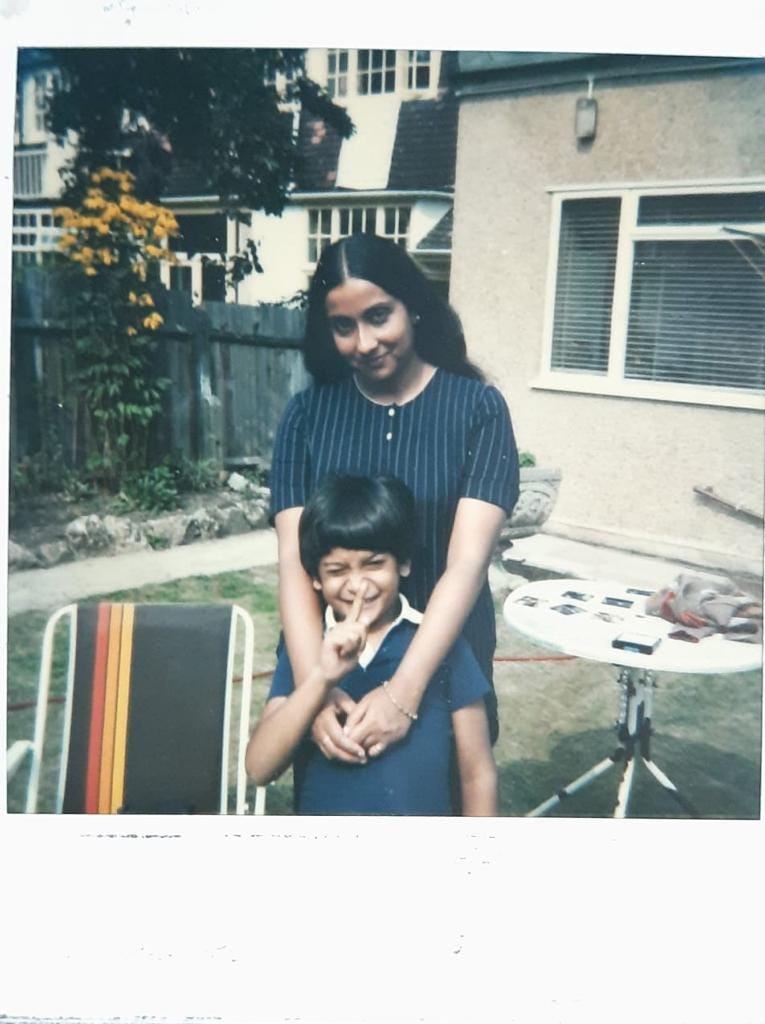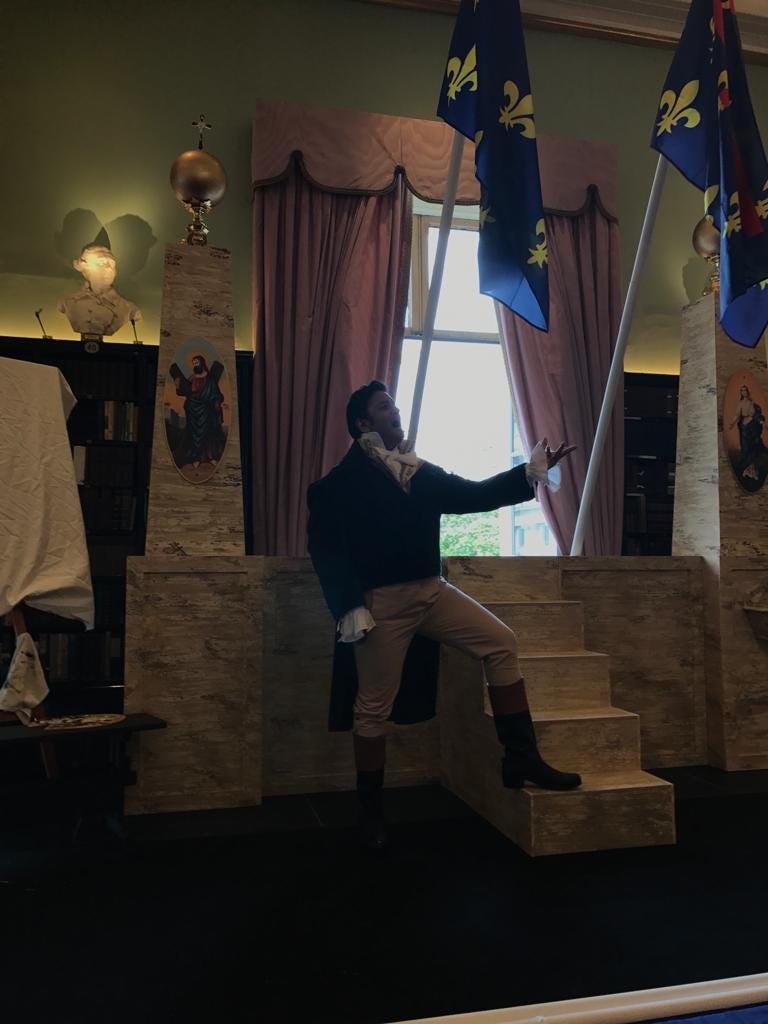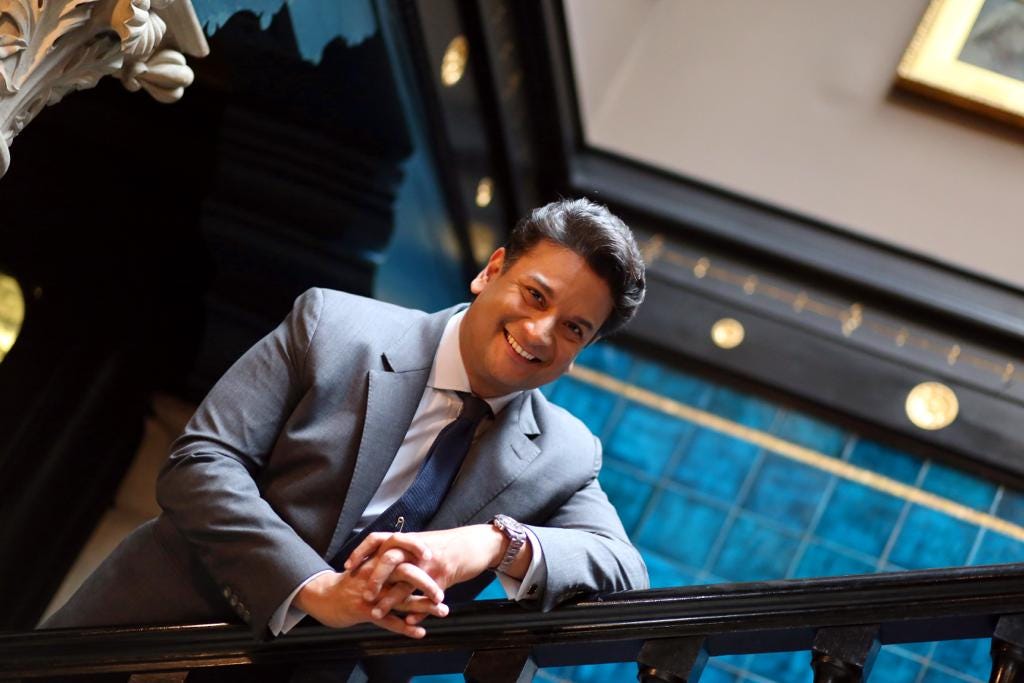Hitting all the right notes
Tête-à-tête with Anando Mukerjee, India's operatic tenor
Anando Mukerjee is a renowned Indian name as an operatic tenor. “I am very proud to say that I come from Bihar. My mother was a pianist in Patna and my earliest memories were of her playing Chopin, Debussy, Ravel.” Speaking to us ahead of his performance with the conductor, Joshua Asokan at St. Ebbe’s Church in Oxford, Anando Mukerjee tells us of his childhood growing up in a predominantly Bengali household in Patna. Mukerjee's influences were largely derived from extended family and parents; his father being a surgeon and mother, a professional pianist. “Bengalis are highly musical and highly artistic. At home, there was art, music, culture and film. At that very tender age, music formed an indelible imprinting on my brain.” Interestingly, Mukerjee notes that his paternal family roots were steeped in Indian classical music. His uncle is the renowned Pandit Amit Mukerjee, one of India’s most famous khayal singers, and the former director of the ITC Sangeet Research Academy in Kolkata. All these factors were crucial to shaping Mukerjee’s career as a tenor.
Mukerjee had piano lessons at the age of 10. But his talents lay in singing rather than in playing the piano. This experience was formative because the musical education of learning the piano and the theory of music was essential to becoming an opera singer. In a few years, Mukerjee discovered his aptitude for singing when he tried to imitate the voices he heard on the radio. He made his public debut with The Capital City Minstrels (CCM), the New Delhi-based classical choir, where Mukherjee was the founding member along with his piano teacher Zohra Shaw. During the 90s, the CCM performed the great choral works in Delhi. It became an outlet for western classical music in the capital city and has just completed it’s 27th anniversary this year.
Not one to tread the beaten path, Mukerjee chose to study natural sciences at Delhi University and then molecular biology at Cambridge University. The same year that Mukerjee graduated from Cambridge was when he decided to formally pursue his training to be an operatic singer. “My parents encouraged me. They were naturally sympathetic to me wanting to become an opera singer. They were also apprehensive as it is a very competitive profession”. He sought out the best teachers and coaches of the finest vocal pedagogues in the world. He started his formal training privately with teachers from the Royal College of Music. Soon he found himself under the tutelage of the Swedish operatic maestro Nicolai Gedda, one of the greatest living tenors of the 20th century. Mukerjee trained under Gedda for about seven years and made his first operatic debut with Puccini’s La Boheme at the National Theatre in Belgrade in 2007. This debut was a baptism by fire with the language barriers and barely a week till showtime. But music transcends these hurdles. In fact, 14 years ago, it was rare to have an Indian tenor perform with the Serbians. Over the course of his stellar career, Mukerjee has sung the roles of some of opera’s most well-known characters, including Rodolfo, the Duke of Mantua, Pinkerton and Nemorino; and appeared at leading international venues including the Belgrade National Opera, Wigmore Hall, Cadogan Hall and the Kennedy Center. “With practice, experience, failures, stage fright and a lot of hard work, determination and ultimately faith, you gain confidence, centredness and equilibrium”, he adds.
Mukerjee is an inspiration for those who dream to pursue an art form as their profession. “It was extremely tough when I entered the profession. Getting into a conservatoire in England, the US or Europe is one thing, getting out is another. There are barriers to Indians abroad and it’s because of visa hurdles.” On home grounds, Mukerjee highlighted the critical role being played by the NCPA in this regard. Along with the Symphony Orchestra of India (SOI), the Royal Bombay Opera house, the NCPA is training Indian musicians and singers. “The South Asian Symphony Foundation is an amazing initiative by Ambassador Rao. She is nurturing Indian and sub-continental talent from all over the world to form a homegrown orchestra. Culturally, India has also changed a great deal from 20 years ago. India is opening up on the world stage and excelling in areas like cinema. In fact, the British conservatoires are very actively looking for Indian students and offering scholarships.”
Mukerjee continues to add more strings to his bow, as he is in the process of being ordained as a priest in the Church of England. The tenor cited his upcoming performance of Handel’s The Messiah as an example of faith and music intersecting. “It is a great classical piece of work and people listen to it as a symphony or to an opera. Handel was a committed Christian and was a deep believer. He set biblical passages (liturgy) to music in order to express his awe and wonder at the Creator. On one hand, it is a secular performance, but it is taking place in a church with Christian musicians. Hence, music transcends so many barriers.”
From zoology, to molecular biology to giving up on a career as a research scientist to embark on a journey as an opera singer, Mukerjee has led an unconventional life. “I have too many interests. If I had not become a musician, I might have become a historian or maybe a philosopher. My passion really lay in history. Unfortunately, in my school they did not offer the arts subjects for the undergraduate degree. I would have probably earned myself a history degree and I probably would have never become a musician.” Mukerjee also admits that he is drawn to the world of philosophy. “Philosophy as the name implies is the love of knowledge. It is multidisciplinary and is an all encompassing subject.”
On the parting note of cultivating the opera field in India, Mukerjee notes that, “Private institutional money and education is very important. The key really is now to find people to collaborate and build on a long term vision for music in India. We need functional opera houses and theatres in the country. That way we no longer outsource but we insource the talent. I would like to be a part of these endeavors in India as a mentor, a teacher and a collaborator but we need the infrastructure.”
The TV theme song that dares you to ‘Skip Intro’
Power, politics, money (and music!)...it's all in the Roy family! The American satirical comedy-drama, Succession, is hands down some of the sharpest, most compulsive, and most gratifying TV viewing there is. But beyond the acting, writing and noteworthy set locations, what helps Succession stand out is that distinctive theme, by Academy Award-nominated composer, pianist and producer Nicholas Britell, which soundtracks the opening credits over a grainy film montage of the central Roy family’s earlier years. The music adds gravitas to this home-video compilation, setting the scene for the family drama about to unfold.
It's rare for a TV theme to have the staying power of a major pop song. But Succession’s title song practically dares you to skip it. So, what makes it so good? And why is a TV show theme song getting stuck in our heads?
Britell is a New York-based composer who has scored films including Moonlight and If Beale Street Could Talk by filmmaker Barry Jenkins, both of which received nominations for Best Original Score at the Academy Awards. He also wrote the scores to films such as The Big Short and Vice. He said, “I think it’s important to always follow things from that almost physical emotional place, as opposed to being too intellectual.” (Variety, September 2021.) And almost physical and emotional it really is. It's the combination of his film scoring experience, mixed with his background in hip-hop that explains why the "Succession" theme song works. The track mixes Britell’s expertise in classical composition with his background making hip-hop beats, layering the two styles.
The theme is orchestrated for piano, strings and drums, and has a distorted bass line. The incredibly catchy and memorable, all jangling piano and stabbing strings directly reflect the shaky alliances and stabs in the back on screen. Powerful string chords respond to the first phrase, then the upper strings take on the melody and develop it into a compelling tune that evokes marvelously the Roy family’s trials and tribulations set against a backdrop of power and greed. Then we have the higher strings, they echo the uncertainty of the piano, which is out of tune. The out of tune piano represents the deep anxiety, dissonance, and abuse lying under the surface. The piano, played in a high register, adds a sense of “urgency or tension,” she says. This main melody is in a minor key punctuated by dissonant chords; some of the piano keys are even struck out of sync, producing a “messy” sound.
It also matters that the music matches and elevates the experience of watching the show. In TV shows, the music becomes its own kind of recurring character, with themes that are expanded and adjusted as needed to match the tone of each scene over the course of many episodes. But in Succession, where the theme pops up as part of the score throughout episodes, the score maintains a straight line. In fact,the score subverts expectations and leaves it up to viewers to determine a scene’s mood or subtext.
Britell says the tune was born from a simple brainwave. “I wanted to explore the idea of ‘If the Roy family could imagine their own music, what music would that be?’” he says. “I started to theorise that it would be this really dark, classical sound.
“Every era has its own musical grammar. If you look back at the late 1700s, there were certain musical conventions that the public of the time were enamoured with. In Succession, it was fun to explore these things,” he adds. (NME interview, 16th June 2020).
News & Updates
We at the South Asian Symphony Orchestra and Foundation are pleased to announce the launch of our brand new website! Our goal with this new website is to provide our visitors with an easier way to learn about musicians, the music landscape and events across the South Asia region.
We are grateful to Prassenjit Lahiri and the team at Social.Friendly for their assistance.
We are so thrilled to say that all the Afghan musicians of SASO together with their other musician compatriots from the Afghanistan National Institute of Music (ANIM) were safely evacuated out of Afghanistan. It was thanks to the valiant, unflagging efforts of their Director and Founder, Dr. Ahmad Sarmast . A total of 101 musicians were evacuated. Meena Karimi has safely arrived at the Interlochen Academy in the United States.
Note from the Editorial Desk
We would like to wish the Friends of the South Asian Symphony Orchestra and Foundation a very Happy Holiday season and a peaceful and prosperous New Year. As this year comes to an end, we wanted to offer our gratitude for your continued support.
We sign off this newsletter and 2021 in the words of Robert Schumann: “To send light into the darkness of men’s hearts – such is the duty of the artist.”
- Alysha Maria Lobo









